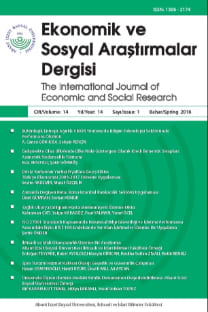ESKİ BİR SORUNA YENİ BİR BAKIŞ AÇISI: ZAMAN HIRSIZLIĞI
Zaman Hırsızlığı, Zaman Haydutluğu, Zaman, Hırsızlık
___
- Barrick, M. R., & Mount, M. K. (1991). The big five personality dimensions and job performance: a meta-analysis. Personnel Psychology, 44, 1–26.Blanchard, A. L. & Henle, C. A. (2008). Correlates of different forms of cyber loafing: the role of norms and external locus of control. Computers in Human Behavior, 24(3), 1067-1084.
- Bozkurt, Ö. Ç., Kalkan, A., Koyuncu, O., & Alparslan, A. M. (2012). Türkiye’de girişimciliğin gelişimi: girişimciler üzerinde nitel bir araştırma. Journal of Süleyman Demirel University Institute of Social Sciences Year, 1(15), 230-247.
- Brock Baskin, M. E., McKee V., & Buckley, M. R. (2017). Time banditry and ımpression management behavior: prediction and profiling of time bandit types. Journal of Leadership & Organizational Studies, 24(1), 39-54.
- Brock, M. E., Martin, L. E., & Buckley M. R. (2013). Time theft in organizations: the development of the time banditry questionnaire. International Journal of Selection and Assessment, 21(3), 309-321.
- Bruk-Lee, V., & Spector, P. E. (2006). The social stressors-counter productive work behaviors link: are conflicts with supervisors and coworkers thesame?. Journal of Occupational Health Psychology, 11(2), 145.
- Colquitt, J.A., Scott, B.A., Judge, T.A., & Shaw, J.C. (2006). Justice and personality: using ıntegrative theories to derive moderators of justice effects. Organizational Behavior and Human Decision Processes, 100, 110–127.
- Corbin, J., & Holt, L.N., (2004). Grounded theory. Research Methods in the Social Sciences. In L. Cathy (Eds.), London: Sage Publications.
- Glaser, B.G. & Strauss, A.L. (1967). The discovery of grounded theory. Strategies for Qualitative Research, New York: Aldine de Gruyter.
- Glesne, C. (2013). Nitel araştırmaya giriş. (Çev. A. Ersoy, P. Yalçınoğlu). Ankara: Anı Yayıncılık.
- Gruys, M. L., & Sackett P. R. (2003). Investigating the dimensionality of counter productive work behavior. International Journal of Selection and Assessment, 11(1), 30-42.
- Güler, A., Halıcıoğlu, M. B., ve Taşğın, S. (2013). Sosyal bilimlerde nitel araştırma yöntemleri. Ankara: Seçkin Yayıncılık.
- Gürbüz, S., & Şahin, F. (2015). Sosyal bilimlerde araştırma yöntemleri. Ankara: Seçkin Yayıncılık.
- Henle, C. A., Reeve, C. L., & Pitts, V. E. (2010). Stealing time at work: attitudes, social pressure, and perceived control as predictors of time theft. Journal of Business Ethics, 94(1), 53-67.
- İslamoğlu, A. H., & Alnıaçık, Ü. (2014). Sosyal bilimlerde araştırma yöntemleri. İstanbul: Beta Basım Yayım.
- Kamdar, D., & Van Dyne, L. (2007). The joint effects of personality and work place social exchange relationships in predicting task performance and citizenship performance”. Journal of Applied Psychology, 92, 1286–1298.
- Ketchen, D. J., Craighead, C. W., & Buckley, M. R., (2008). Time bandits: how they are created, why they are tolerated, and what can be done about them. Business Horizons, 51, 141–150.
- Lim, V. K. (2002). The it way of loafing on the job: cyber loafing, neutralizing and organizational justice. Journal of Organizational Behavior: The International Journal of İndustrial, Occupational and Organizational Psychology and Behavior, 23(5), 675-694.
- Liu, Y., & Berry, C. M. (2013). Identity, Moral and Equity Perspectives on the Relationship between Experienced Injustice and Time Theft. Journal of Business Ethics, 118(1), 73-83.
- Lorinkova, N. M., & Perry, S. J. (2017). When is empowerment effective? the role of leader-leader exchange in empowering leadership, cynicism, and time theft. Journal of Management, 43(5), 1631-1654.
- Lucacs, E., Negoescu, G., & David, S. (2009). Employees misbehavior: formes, causes and what management should do to handle with. economics and applied ınformatics. The Annals of “Dunarea de Jos” University of Galati, 2, 315-322.
- Martin, L. (2009). Time banidtry: validation of a measure of counter productive work behavior, Unpublished dissertation of doctor, University Of Oklahoma.
- Martin, L. E., Brock, M. E., Buckley, M. R., & Ketchen, D. J. (2010). Time banditry: examining the purloining of time in organizations. Human Resource Management Review, 20, 26– 34.
- Miles, M.B., & Huberman, A.M. (1994). Qualitative data analysis. Thousand Oaks, Ca: Sage.
- Owens, J. M. (2018). Business owner perceptions of organizational time theft: a phenomenological approach, Unpublished dissertation of doctor, North Central University.
- Peng, Y., Jex, S., Zhang, W., & Matthews R. A. (2019). Elder care demands and time theft: ıntegrating family-to-work conflict and spillover–crossover perspectives. Journal of Business and Psychology, 1-14.
- Robinson, S. L. & Bennett, R. J. (1995). A typology of deviant work place behaviors: a multidimensional scaling study”. Academy of Management Journal, 38(2), 555-572.
- Sargut, A. S. (2015). Kültürlerarası Farklılaşma ve Yönetim. Ankara: İmge Kitabevi
- Wimbush, J. & Shepard J. (1994). Toward and understanding of ethical climate: its relationship to ethical behavior and supervisory influence. Journal of Business Ethics, 13, 637– 647.
- Yıldırım, A. & Şimşek, H. (2008). Sosyal bilimlerde nitel araştırma yöntemleri. Ankara: Seçkin Yayıncılık.
- Zoghbi Manrique de Lara, P. (2006). Fear in organizations: does intimidation by formal punishment mediate the relationship between interactional justice and workplace internet deviance?. Journal of Managerial Psychology, 21(6), 580-592.
- ISSN: 1306-2174
- Yayın Aralığı: Yılda 2 Sayı
- Başlangıç: 2005
- Yayıncı: Abant İzzet Baysal Üniversitesi İktisadi ve İdari Bilimler Fakültesi
UYARLAMA MALİYETLERİ VE Q İLE GECİKMELİ YATIRIM ETKİLERİ ARASINDAKİ DENGELEME
G20’NİN HETEROJEN SEKİZ ÜLKELERİNDE FİNANSAL KRİZLERİN BELİRLENMESİ VE ÖNCÜ GÖSTERGELERİNİN TAHMİNİ
EBEVEYNLERİN ÇEVRİM İÇİ RİSK VE ÇEVRİM İÇİ FAYDA ALGILARININ TEKRAR SATIN ALMAYA ETKİSİ
Meftune ÖZBAKIR UMUT, Şükran KARACA
GAZÂLÎ’NİN İSLAM İKTİSAT DÜŞÜNCESİ ÇERÇEVESİNDE TİCARET VE SERVET ANLAYIŞI
TÜRKİYE’DE AR&GE HARCAMALARI VE EKONOMİK BÜYÜME İLİŞKİSİ: FOURIER ADL EŞBÜTÜNLEŞME ANALİZİ
EBEVEYNLERİN ÇEVRİM İÇİ RİSK VE ÇEVRİM İÇİ FAYDA ALGILARININ TEKRAR SATIN ALMA NİYETİNE ETKİSİ
Meftune ÖZBAKIR UMUT, Şükran KARACA
ÜLKELERİN DEMOKRASİ SEVİYELERİNİN KÜRESEL CİNSİYET UÇURUMA ETKİSİ: OECD ÜLKELERİ ÜZERİNE BİR ÇALIŞMA
ORGANİK TOPLUMDAN EKOLOJİK TOPLUMA
TÜRKİYE’DE ENFLASYON, FAİZ, VERGİLER VE GELİR DAĞILIMI İLİŞKİSİ: AMPİRİK ANALİZ
